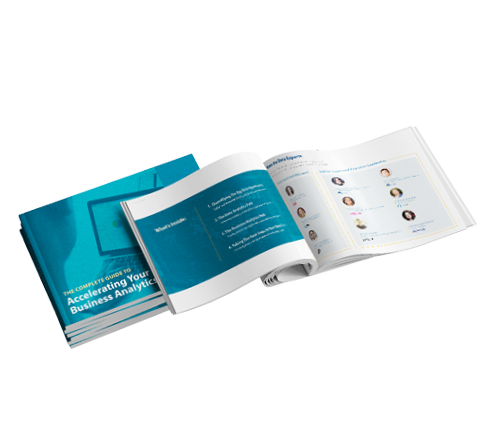Request Information
We're Sorry
There was an unexpected error with the form (your web browser was unable to retrieve some required data from our servers). This kind of error may occur if you have temporarily lost your internet connection. If you're able to verify that your internet connection is stable and the error persists, the Franklin University Help Desk is available to assist you at helpdesk@franklin.edu, 614.947.6682 (local), or 1.866.435.7006 (toll free).
Just a moment while we process your submission.

Master's in Business Analytics Salary: What You Can Expect
In our technology-driven world, businesses rely on data—both big and small—to make evidence-based decisions and stay competitive in their market.
While collecting and organizing this data is important, how it’s analyzed is what benefits a business’ bottom line. Utilizing, manipulating and applying data models to inform business decisions is the critical work of business analytics professionals. From marketing to finance, business analysts identify trends, risks and opportunities to calculate ROI and help the business reach its goals.
Because of the pivotal role of business analysts, this career path offers a wealth of job opportunities and high earning potential. But how do you gain the skills to make accurate and strategic decisions? A master’s in business analytics provides the practical knowledge to lead businesses in making data-driven decisions, while also increasing your salary expectations.
According to Payscale, the average salary for someone with a master’s degree in business analytics is $72,000. Whether you’re currently working in a data-driven role or you’re looking to change careers, a master’s in business analytics could benefit you. Let’s look at what makes someone successful in this career, typical jobs they fill and average salaries they earn.
7 Questions to Determine if a Career in Business Analytics is Right For You
Choosing a master’s degree is a big decision. While high salaries can be a strong incentive, they shouldn’t be the sole reason you choose a career. Make sure you choose a master’s program you’re truly passionate about and will lead to a long-term, fulfilling career. Wondering if business analytics is the right path for you? Ask yourself these questions:
- Are you the type of person who likes to do in-depth research before making a decision?
- Are you detail-oriented but don’t lose sight of the big picture?
- Do you enjoy using data to solve real-world challenges?
- Would you like to learn how to use tools to analyze, visualize and present information?
- Are you naturally curious and want to discover “why” something happens?
- Do you love to solve puzzles or riddles?
- Are you comfortable taking historical data to make predictions about the future?
If the majority of your answers are “yes,” you may be well suited for a career in business analytics.
Get a FREE roadmap that includes insider information to help you maximize the many opportunities in the fast-growing field of Big Data.
7 Top Paying Jobs For Candidates With A Master’s in Business Analytics Degree
A master’s in business analytics is an extremely flexible degree. You can work in any number of industries, applying your knowledge of data to solve organizational challenges, find opportunities and reach business goals.
We’ve compiled a list of top jobs you can pursue with your master’s degree. These roles are needed in a wide range of organizations—from Fortune 500s to startups. See which jobs are an ideal fit for your career interests.

Senior Business Analyst
Would you like discovering ways to increase profits and margins for a business? Senior business analysts are able to take vast amounts of organizational data and understand how to apply it to meet business objectives. They’re responsible for using data to identify strengths and weaknesses and suggest improvements that will improve a company’s profitability and competitiveness in their market. Job Responsibilities:
- Gather and analyze information from diverse sources to identify trends, opportunities and risks
- Work with other teams to identify gaps in data and plan to acquire the needed information
- Collect detailed information through interviews, surveys, secondary research and other cutting-edge methods
Average Salary: $84,081 (Payscale)
Business Insight and Analytics Manager
Would you like to use data to guide business strategy? Business insight and analytics managers are responsible for heading a team of analysts and ensuring the accuracy of their findings. They also identify market trends and forecast how their company should evolve based on their findings. Job Responsibilities:
- Track, synthesize and evaluate performance against benchmarks and business goals
- Create reports that can be shared with leadership to influence business strategies
- Develop systems and frameworks for acquiring, validating and applying data to business challenges
Average Salary: $96,005 (Payscale)
Manager of Financial Planning and Analysis
Do you thrive on turning data into actionable insights? A manager of financial planning and analysis is responsible for using data to forecast a business’ performance. They identify data abnormalities, trends and variables to provide insight into improvements that will benefit a company financially. Job Responsibilities:
- Analyze short-term cash flow to determine long-term forecasts
- Provide financial projections and proactively formulate solutions to improve performance
- Develop systems and internal controls for financial data
Average Salary: $99,545 (Payscale)
Senior Financial Analyst
Do you enjoy diving into detailed financial data? Senior financial analysts must be experts in analyzing accounting information, determining economic and financial risks, and developing solutions for the challenges their team identifies. Job Responsibilities:
- Support company projects and objectives through financial analysis
- Create comprehensive annual budgets and monthly financial forecasts
- Develop schedules for financial analysis to compare forecasts with actuals and provide rationale for any variances
Average Salary: $79,313 (Payscale)
Quantitative Analyst
Are you enthralled by stock market fluctuations? Quantitative analysts develop strategies to help companies maximize their investments. They create data models to help improve trading processes and strategies to increase business profits. Job Responsibilities:
- Research and analyze market data and perform risk analyses
- Design experiments to collect information and test new software programs and data models
- Manage portfolios and recommend stock trades to improve performance
Average Salary: $83,477 (Payscale)
Analytics Consultant
Do you love a challenging problem? Analytics consultants develop and implement data-driven solutions for their organization or clients. They are responsible for mining data and using that information to meet an organization's needs. Job Responsibilities:
- Recommend systematic changes to improve organizational data and how it is used
- Audit data and implement new processes for ensuring quality outputs
- Synthesize information into reports and benchmarks that can be used to evaluate future performance
Average Salary: $80,588 (Payscale)
Senior Marketing Analyst
Do you want to drive how your business goes to market? Senior marketing analysts develop and execute strategies for sales and advertising to position companies within their market. They determine how companies can increase ROI on marketing spend to increase revenue, improve brand awareness and reach new customers. Job Responsibilities:
- Collect and analyze data to support marketing initiatives
- Research consumer behavior and trends to predict campaign performance
- Work with internal teams to address consumer needs and optimize customer service strategy
Average Salary: $73,109 (Payscale)
Ready to Get Your Master’s Degree in Business Analytics?
Not all business analytics programs are created equal. If you think business analytics is the right career path for you, the next step is to find the right master’s program. For working professionals looking to advance their career without taking time out for a master’s program, an online, applied master’s program is a great way to accomplish both aims. Not only will you gain new skills, you’ll be able to apply them to your everyday job. Franklin University offers a cutting-edge program in business analytics that will give you the tools to manipulate data, identify trends and solve real-world business challenges. You’ll also gain communication and presentation skills to position yourself as a leader in your organization. Explore the Franklin University M.S. in Business Analytics program to see how it can help you reach your professional goals.





